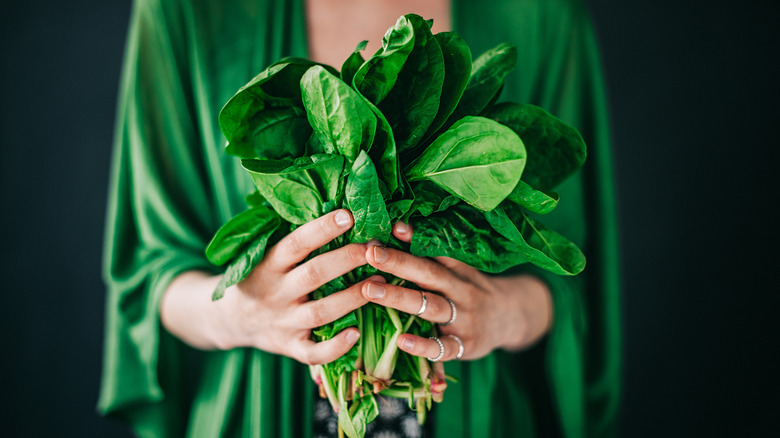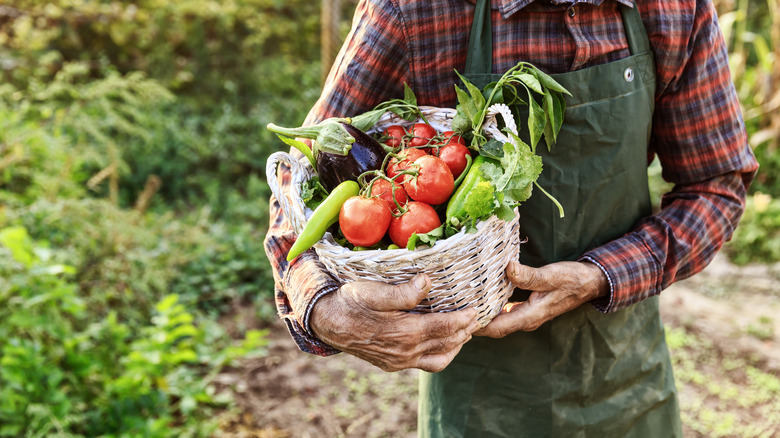Vegetables You Shouldn't Eat Every Day
Kids might play with vegetables or get rewarded for eating them, but as an adult, you know how important vegetables are to your overall health. Vegetables are low in calories and high in fiber that control your blood sugar and your waistline. Vegetables have vitamins, minerals, and other nutrients that prevent conditions such as cardiovascular disease, cancer, and diabetes. The United States Department of Agriculture recommends getting a minimum of 2 ½ cups of vegetables a day, particularly veggies that are dark green, red, and orange.
While that leaves you with plenty of options for getting in your daily vegetables, you probably have some that you prefer more than others. Vegetables like potatoes, corn, and tomatoes might be more likely to appear in your grocery carts and on your dinner plates rather than turnips, beets, or radishes. Love them or hate them, some of these veggies might not be best to eat every day. Some vegetables could aggravate inflammation, spike your blood sugar, or increase your risk of kidney stones.
Vegetables high in oxalate can increase your risk of kidney stones
Oxalates are naturally occurring compounds found in some foods that bind to minerals in your body, and while they aren't necessarily bad, high amounts of oxalates can pose problems for people with kidney disease or kidney stones. Most kidney stones are calcium oxalate stones, and they develop when excess oxalates bind with calcium in your kidneys. Vegetables that have high oxalates are spinach, potatoes, and beets.
Oxalates can also build up in your digestive system if you're taking antibiotics. Antibiotics not only kill off pathogens but also the good bacteria that feed on oxalates. This buildup of oxalates could limit vital minerals from being absorbed by your body.
If you love spinach or other foods high in oxalates, cooking these foods can reduce these oxalates. To prevent calcium oxalate kidney stones, combine high-oxalate foods with foods rich in calcium. The calcium in your meal will bind with the oxalates and pass through your digestive system before they can reach the kidneys.
Vegetables that could trigger inflammation or spike your blood sugar
Some people have problems digesting nightshade vegetables, which have a toxin called solanine that can pose problems if large amounts are ingested. Potatoes, tomatoes, eggplant, and peppers are all nightshades. For most people, nightshades can provide plenty of vitamins and antioxidants, but for some people with autoimmune conditions such as inflammatory bowel disease, eating nightshades might have a risky side effect of aggravating their symptoms. Some people also believe nightshades trigger inflammation that can cause arthritis pain, but the Arthritis Foundation says there's little research supporting this link. People might be allergic or sensitive to nightshades, so they should try eliminating them from their diet to see if their condition improves.
Vegetables are typically low on the glycemic index (GI), which means they're digested more slowly and cause less of a spike in your blood sugar. Yet carrots, potatoes, and pumpkin can have a higher GI. Cooked carrots can carry a GI of 85, boiled potatoes can score 70, and boiled pumpkin has a 75 GI. However, carrots and pumpkin have a low glycemic load, which factors the amount of carbohydrates and portion size into how quickly it can raise your blood sugar.



